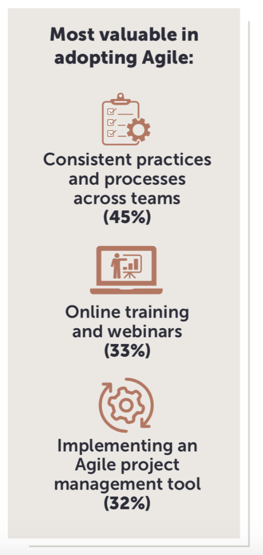In the startup world of “move fast and break things,” deliberately adopting Agile process practices may rank low on leadership’s list of priorities. Even if Agile practices do make it into the organization at an early stage, it’s usually just in the RnD department, where new generation developers are bred Agile from the get-go.
“We don’t need process, we need results,” is the cry from startup CEOs trying to fill their monthly investor reports with ever more impressive numbers.
For many startup founders, there’s no clear link between Agile marketing and good results for their shareholders’ meeting. In reality, going Agile at the beginning of a business journey can save a lot of headaches (and losses) in the long run.
Why Startups Are Ideal for Agile Marketing
Investing in a lengthy Agile marketing transformation when your company is already set in its ways will take a considerable cut from organizational resources. Doing so as a startup, however, can come cheap and help you move fast (without breaking so many things).
Small businesses and startups are already starting to pay attention to their organic advantage and being successful with Agile practices. 40% of respondents in this year’s annual State of Agile Marketing Report say that they are applying some Agile marketing practices in teams of 10 people or fewer, and within organizations of 100 or less people.
Although Agile Marketing is becoming increasingly popular among enterprises, it is spreading like wildfire among startups. Here’s why.
Generally, using the Agile process in a startup marketing team has the potential to:
-
- improve productivity
- enhance marketers’ ability to react to changing priorities
- increase innovation
- accelerate delivery times of your campaigns
Not only are startups in serious need of these benefits, but they are in a more advantageous position than large enterprises to receive them.
Startups + Agile Marketing = Early Wins
Startups can capitalize on their small size and fluid structure to create the right environment for Agile to flourish. This is what makes startups such great candidates for adopting Agile, even if they don’t know it yet.
If you’re a startup founder or leader, you can take advantage of your circumstances. Adopting Agile in your marketing team at this stage is one of the wisest investments you could make in your company’s future. Get acquainted with some of the reasons why.
1. Startup Opportunities for Consistent Practices and Processes
When adopting Agile, the most valuable factor among the 400+ marketers, who participated in the 2019 State of Agile Marketing Report from AgileSherpas and CoSchedule, was “having consistent practices and processes across teams.”
In a startup, the inherent fluidity and cross-functionality of team members make it easy for Agile practices to get a foothold in several teams at once.
As more team members have occasion to collaborate in a startup environment, they develop their own rulebook of Agile best practices. Then, they start making them a part of their process. Their constant communication and tight deadlines often result in a communal process structure that the entire team is accountable for.
In other words, they can’t help but have a consistent, agile process. So, what may seem impossible in a fragmented enterprise with tens or hundreds of siloed teams and departments can be achieved over the course of several weeks within a small, unified startup.
Source of graphic: AboutPeople.com
2. Faster Knowledge Sharing Creates Shared Understanding
Smaller team sizes in a startup make it easier to share knowledge among the members of the entire organization. This comes in handy when a team or the entire staff need to be trained in something new. In a large enterprise, teams will need to be trained in batches over an extended period of time. However, in a startup, the entire organization can be trained at once.
Getting to know Agile marketing concepts together with your peers, instead of learning about Agile without those with whom you need to collaborate, can help the group develop a shared understanding that they build upon together.
Source of graphic: KnowledgeHut
3. Agile Project Management Tools From the Start
Thirty-two percent of marketers said that when adopting Agile, it was very valuable to implement an Agile project management tool. Tools built around the Agile methodology help the team map their workflow, make their tasks visible to each other and promote explicit policies. Traditional tools will often discourage Agile principles, or will require workarounds to accommodate an Agile marketing workflow.
As most new startups are not contractually or mentally bound to an existing project management tool, it’s easier to implement new tools within the team. On the other hand, larger organizations invest a huge amount of resources in getting all of their teams on one robust system. This makes it very difficult for the entire organization to switch to a lighter Agile project management tool, even if they wanted to.
Source of graphic: Lynda.com
4. Entrenching Agile Marketing Values in Leadership Early
As your startup grows, your first junior hires will transform into your company’s decision-makers. In time, these people will become integral to the business scale-up.At this stage, the process values and principles your leaders subscribe to will become a crucial factor in your success. Executives who have matured within the context of an Agile organization are much more likely to become Agile leaders. They also prove to be much more effective in spreading Agile practices among new hires.
Enterprise organizations that have been around longer usually have leaders who subscribe to more traditional methodologies. Even if an Agile transformation is on the table, it can be a big challenge to convince traditional leaders to undertake it.
Startups can bypass the barrier that a “lack of executive sponsorship” represents. Further, they can capitalize on the fact that their leaders prefer Agile, instead of fearing its disruption.
5. Impact Goes Further, Faster
For small startups, Agile is a natural advantage, mainly due to their size and organic team dynamic. I think we’d all agree that it’s much easier to change the work habits of a group of 10 people, than it is to do so for a group of one hundred people.
In startups, these smaller specialized units also have a faster natural iteration cycle, which they must maintain to find product/market fit and grow at a healthy pace. So, in a way, they’re already one step closer to Agile.
A faster pace, smaller size, and built-in flexibility means that the impact of integrating new practices has the potential to be felt immediately across the entire organization. In a startup, even just applying the three most popular Agile practices can have very palpable effects on organizational visibility, speed and employee morale. So, what are you waiting for? If you’re a leader or founder in a startup, you’re in a very advantageous position to adopt Agile marketing early. The friction you’ll face during an Agile implementation is next to none when compared to the difficulties older, stagnating enterprises face during theirs.
As you grow, these process values and principles will spread among other teams and help your organization continuously improve. If you’re already implementing Agile marketing practices in your startup, let us know which ones are having the biggest positive or negative impact in the comments below!





